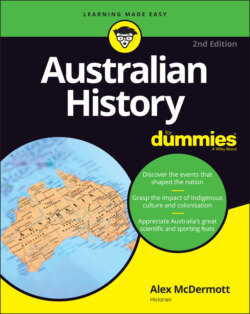Читать книгу Australian History For Dummies - Alex McDermott - Страница 62
Using convicts as guards
ОглавлениеPhillip had his problems getting convicts to work in the new settlement at Sydney, but the convicts weren’t the only troublesome bunch. Phillip’s other big problem was the officers and soldier marines.
The soldiers refused to guard the convicts, insisting it wasn’t their job because they weren’t prison wardens. The ensuing discussion must have been something like the following: ‘You’re kidding?’(from Arthur Phillip). ‘Can’t you at least keep an eye on them? Encourage them to till the soil a little more enthusiastically?’ ‘Nope’ (delivered flatly, from the soldiers). ‘We’re officers and soldiers. We’re here to protect you from foreign attack, or put down uprisings. Anything else is most definitively Not Our Problem.’
So Phillip was forced to appoint convicts as overseers, which made for a strange situation (prisoners guarding prisoners), but was nothing compared to when Phillip was forced by necessity to make convicts nightwatchmen and constables. This meant, of course, that soon enough you had convict constables arresting marines doing wrong. The officers flipped, but Phillip’s sympathy was, shall I say, not greatly discernible.
Phillip wrote to Britain with complaints — the convicts wouldn’t farm and the soldiers wouldn’t guard — and asked that Britain start sending out free settlers, arguing he could provide each settler with convicts as labourers. From his comfortable digs in Soho Square, Sir Joseph Banks (the botanist who had sailed with Cook and had pushed for the settlement of NSW in the first place) thought this was a terrific thing to do. He urged the government to send out free families, and to give them land grants, ten convicts and four years’ support. Both Phillip and Banks were ignored, however, and the plan went nowhere. As time went on, it became more and more clear that the people sent out on the First Fleet would be the kind of material the new colony had to work with. The colony would sink or swim with these most dubious elements of Georgian Britain.
